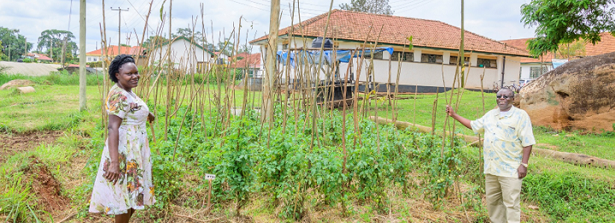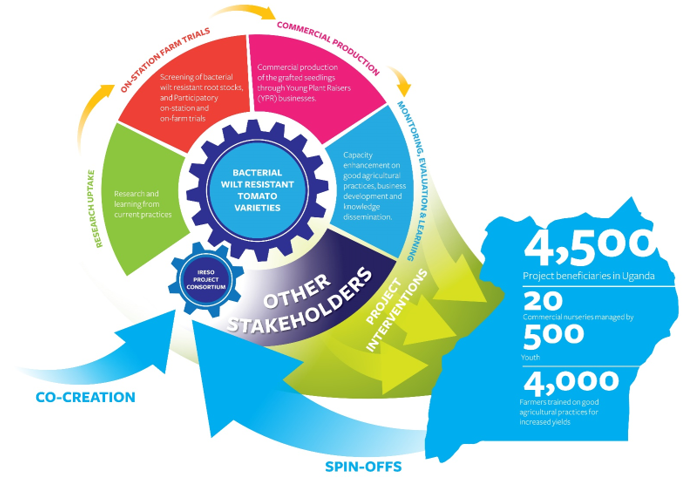Co-creation and Research Uptake: The best way to go

As a principal investigator on the “Improved Resilience through Sustainable Production of Grafted Tomato” in Uganda – Applied Research Fund (ARF) project IRESO, I had the opportunity to participate in an impact oriented international workshop between February 13 and 16, 2018, in Addis Ababa, Ethiopia.
The Food & Business ARF Third International Workshop was jointly organized by the Netherlands Organization for Scientific Research (NWO-WOTRO), the Food & Business Knowledge Platform (F&BKP), AgriProFocus Ethiopia and the International Food Policy Research Institute (IFPRI). Please find more articles on the workshop here.
In this blog I describe my reflections on the main workshop concept, aiming at the improvement of research for business and food security development.
Image: Project IRESO – Maureen, Research Technician and Africano, Research Scientist at the field plot trial of grafted tomato, NaCRRI. Picture taken by Joshua Rukundo, 19 March 2018.
Co-creation: project contributions from all will improve impact
The workshop focused on researching desirable innovations of doing business among members of ARF project consortia. The cornerstone to this innovative way of research for development emphasizes on generating synergies from all consortium members (from academia and private and public background) to deal with even difficult situations and in the end, finding appropriate solutions to such problems. The ultimate aim is to achieve a conspicuous impact made from contributions and efforts of all team members resulting into positive developmental change. In this synergy enhancing mode, the knowledge and contributions of all participants are galvanized collectively to create significant impact deliverables along any value chain. This combined effort to achieve developmental objectives with enthusiasm from all team members is called Co-creation. This Co-creation approach takes into account the ideals that nobody has a “monopoly of knowledge” and that the more the facilitators of teams allow contributions from all stakeholders within the research group work, focused to the same developmental objective, the greater the impact will be than from one or few individuals.
Research Uptake: Engaging from the start will lead to the delight of all stakeholders
In order to achieve such deliverables, the research group facilitators have to instill enthusiasm and debate among not only the stakeholders within the research group, but also in the related context the research aims to have impact on the subject-matter in order to adapt the research to practical realities. These stakeholders may be from both public and private sector background such as knowledge institutions (Universities or Research Institutions), business institutions and or even farmers. Engaging the ones outside the consortium from the beginning of the project on is referred to with the concept Research Uptake. The concepts Co-creation and Research Uptake generate a higher multiplier effect resulting into the needed developmental good, thus achieving the anticipated positive impact; to the delight of all stakeholders.
Is the -researcher- “Boss” always right?
As far as I am concerned, this becomes an innovative way of managing developmental change or projects for development, and I give a credit to NWO-WOTRO, the F&BKP and ARF who have spearheaded this concept that overrides the old concepts that were more oriented to top-down approaches that tended to look at the “manager” and the “managed”, thereby emphasizing on the wrong belief that “the -researcher- Boss is always right”. In such concepts, contributions from other stakeholders, who were also knowledgeable, were overlooked resulting into less enthusiasm and debate, thus reducing team work among all members. The other benefit of the Co-creation and Research Uptake approach is that, in taking all ideas from consortium members and external stakeholders, harmonious working relationships and team building are created, thereby enhancing learning from each other and building a formidable work force to make the developmental objective and the necessary impact.
Impact in shorter time and with less funding
Under such a project enhancement approach, impact can even be achieved in a shorter time without spending exorbitant funds as all human resources are tapped, tagged and locked on to the project, to the satisfaction of all stakeholders including the development partners and the tax payers. I find this concept of Co-creation and Research Uptake very applicable to modern ways of doing research for development and would highly recommend it for consideration by scientists in developing countries to adopt it if we are to create impact and developmental change in our societies.
Although at first, this concept looked unpractical to me and many of us, it was later realized that this was the best way to go; in building teams and project ownerships to enhance development. To my surprise, the practicability of this concept is not limited to project development and implementation levels only. It can still be applied beyond these benchmarks and build synergies into technology and information dissemination pathways. Through co-creation, participants can identify practical solutions to catapult and boost technology and information uptake to end users. At such levels, involving and consulting end users becomes crucial, especially when scientists become conscious that these have the expert knowledge in advising on what, when and how they want these technologies packaged and delivered to them. At lower levels of technology dissemination, it is even more important that facilitators exhibit use of easy terminologies in order to tickle discussions and participatory contributions among the end users. This can be achieved if facilitators display a high level of simplicity, listening to and respecting the views of the end users so that the discussions are made in languages commonly understood by both parties including local vernacular languages at the grassroots with easily understandable visual aids.

Figure: Project IRESO Model, Created by Joshua Rukundo & Julius Ssemyalo with input from Africano Kangire (PhD), 16 March 2018.






